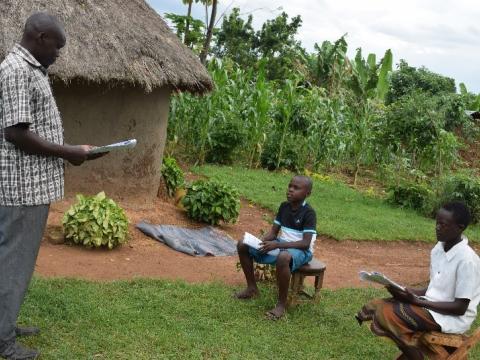Learning made easy in Busia District

By Simpson Biryabaho, Program Manager, Busia Program, eastern Uganda
On 20 March 2020, the Government of Uganda issued an order for the closure of schools following the outbreak of COVID-19. This left many school-going children befuddled, anxiously waiting for schools to re-open. Additionally, the Government, through its Ministry of Education, came up with guidelines on how to ensure that children are not redundant throughout this period. One of these was through the distribution of self-study learner materials meant for all children in communities. The sub-counties of Lunyo, Busime, Busitema and Sikuda in Busia District where World Vision implements various development projects received 9,892 materials. Every parent was expected to make a copy for their children.
In Busia District, majority of households (69%) derive their livelihoods from subsistence farming and only 27% depend on an earned income (Uganda Bureau of Statistics census report 2014). With this, majority of parents in the area were not able to photocopy the materials because even accessibility was hard, leaving less privileged children in dire need of learning materials.
The World Vision international partnership launched a bold new global strategy called “Our Promise 2030” to, not just fulfil the organisation’s mission, but also deliver on the 17 Sustainable Development Goals (SDGs). The strategy emphasises ‘building brighter futures for vulnerable children’ by creating partnerships, joint ventures and advocacy with people who share similar goals. World Vision's Uganda office is fully aligned to this strategy and in the process of concluding its 2016-2020 strategy implementation with the goal to contribute to the increase in the number of primary school-going children who can read, and to ensure that children are educated for life.
With the closure of schools, many children’s capacity to learn at home is limited because of their inability to access teaching resources like teachers and learner materials. World Vision stepped in to avert this situation by making use of community literacy facilitators who extend learning services to children within their homes. The organisation facilitated the printing of learning materials for children in Primary 4 to 7. Community literacy facilitators were identified from within communities, to voluntarily accept to extend education services through the literacy centre approach used by World Vision.
“When I received the materials for learning from World Vision, I was not able to understand anything. I then went to look for Mr Bernard Wandera to assist me in understanding because I needed to make sure that I excel,” said Monday Elisha, a Primary 7 pupil of Sikuda Primary School.
Other difficulties the learners face include limited transport means and lack of guidance from parents because most of the guardians are illiterate. Bernard, a community facilitator and a trained secondary school teacher from National Teachers’ College (NTC), Kaliro, walks 4km every Monday, Wednesday, Friday and Saturday to different homes to help children understand learning materials that were given to them.
“We are driven by passion. Because we have seen Government and other partners give out personal protective equipment to health workers, we are also giving back to our children by extending education services to them voluntarily,” said Bernard.
Nelly Aceng, whose dream of being a nurse had almost been shattered, is grateful for World Vision’s intervention. “My dream is to become a nurse and science stands out as my best subject. Failing to understand this material was almost a shattered dream for me but because of the community facilitators in this place, I thank World Vision so much because I now see that dream is going to come true.”
“We thank World Vision for the work they do and continue to do with us in ensuring that children in our communities are reached with education services,” noted Richard Obua, the chairman of the reading club in Sikuda sub-county.
Despite parents’ hesitation to release their children for such learning opportunities due to fear of COVID-19 spreading, limited comprehension of the content in the materials, and interruption from parents to engage the children to do house chores, the community facilitators have continuously conducted door to door sensitisation, a methodology that is working. To date, 262 Primary 7 children are being supported with this learning approach in Busitema and Sikuda sub-counties.-
“When I wake up in the morning, I do house chores, and then I read my books. I then prepare lunch. After lunch, I continue to read until evening. This has greatly helped me to cope with my studies because when the teacher comes, I can vividly remember what was taught in the last lesson,” said Judith Babirye, a Primary 7 pupil of Nangulu Primary School in Busitema sub-county.
To date, World Vision has supported in the printing and distribution of learner materials to 4,301 pupils between Primary 5 and 7 in Lunyo, Busime, Busitema and Sikuda sub-counties. Among these are 1,103 children registered in World Vision's sponsorship programme.
Learn more about and/or support World Vision’s global work to limit the spread of COVID-19 and support the children impacted by it on our COVID-19 Emergency Response Page.